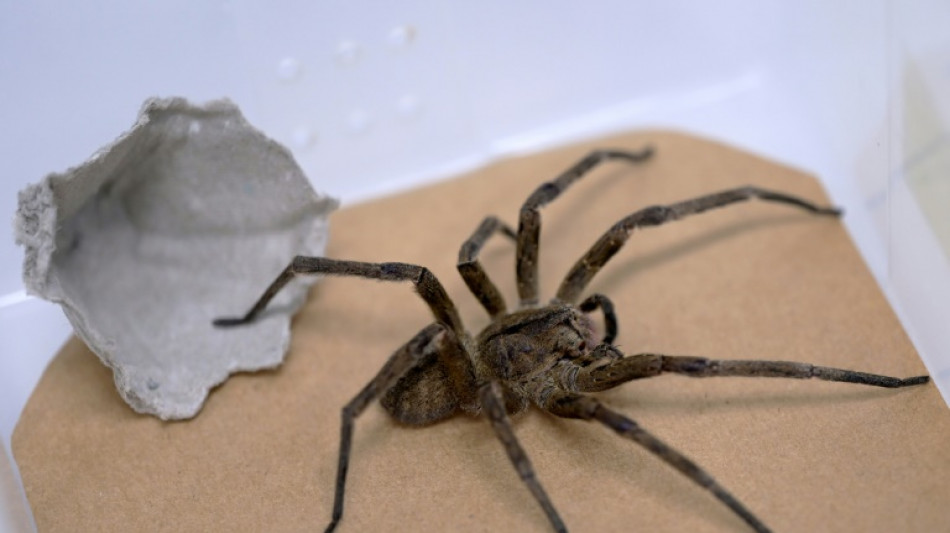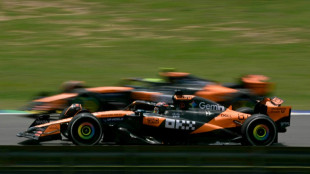
-
 Deadly storm sparks floods in Spain, disrupts Portugal vote
Deadly storm sparks floods in Spain, disrupts Portugal vote
-
Ukrainian flag bearer proud to show his country is still standing

-
 Carney scraps Canada EV sales mandate
Carney scraps Canada EV sales mandate
-
Morocco says evacuated 140,000 people due to severe weather

-
 Spurs boss Frank says Romero outburst 'dealt with internally'
Spurs boss Frank says Romero outburst 'dealt with internally'
-
Giannis suitors make deals as NBA trade deadline nears

-
 Carrick stresses significance of Munich air disaster to Man Utd history
Carrick stresses significance of Munich air disaster to Man Utd history
-
Record January window for transfers despite drop in spending

-
 'Burned inside their houses': Nigerians recount horror of massacre
'Burned inside their houses': Nigerians recount horror of massacre
-
Iran, US prepare for Oman talks after deadly protest crackdown

-
 Winter Olympics opening ceremony nears as virus disrupts ice hockey
Winter Olympics opening ceremony nears as virus disrupts ice hockey
-
Mining giant Rio Tinto abandons Glencore merger bid

-
 Davos forum opens probe into CEO Brende's Epstein links
Davos forum opens probe into CEO Brende's Epstein links
-
ECB warns of stronger euro impact, holds rates

-
 Famine spreading in Sudan's Darfur, warn UN-backed experts
Famine spreading in Sudan's Darfur, warn UN-backed experts
-
Lights back on in eastern Cuba after widespread blackout

-
 Russia, US agree to resume military contacts at Ukraine talks
Russia, US agree to resume military contacts at Ukraine talks
-
Greece aims to cut queues at ancient sites with new portal

-
 No time frame to get Palmer in 'perfect' shape - Rosenior
No time frame to get Palmer in 'perfect' shape - Rosenior
-
Stocks fall as tech valuation fears stoke volatility

-
 US Olympic body backs LA28 leadership amid Wasserman scandal
US Olympic body backs LA28 leadership amid Wasserman scandal
-
Gnabry extends Bayern Munich deal until 2028

-
 England captain Stokes suffers facial injury after being hit by ball
England captain Stokes suffers facial injury after being hit by ball
-
Italy captain Lamaro amongst trio set for 50th caps against Scotland

-
 Piastri plays down McLaren rivalry with champion Norris
Piastri plays down McLaren rivalry with champion Norris
-
ECB holds interest rates as strong euro causes jitters

-
 Spain, Portugal face floods and chaos after deadly new storm
Spain, Portugal face floods and chaos after deadly new storm
-
EU close to sealing trade deal with Australia

-
 German Cup final to stay in Berlin until 2030
German Cup final to stay in Berlin until 2030
-
What does Iran want from talks with the US?

-
 Taming the lion: Olympians take on Bormio's terrifying Stelvio piste
Taming the lion: Olympians take on Bormio's terrifying Stelvio piste
-
Wind turbine maker Vestas sees record revenue in 2025

-
 Italy's Casse tops second Olympic downhill training
Italy's Casse tops second Olympic downhill training
-
Anti-doping boss 'uncomfortable' with Valieva's coach at Olympics

-
 Bitcoin under $70,000 for first time since Trump's election
Bitcoin under $70,000 for first time since Trump's election
-
'I am sorry,' embattled UK PM tells Epstein victims

-
 England's Brook predicts record 300-plus scores at T20 World Cup
England's Brook predicts record 300-plus scores at T20 World Cup
-
Ukraine, Russia swap prisoners, US says 'work remains' to end war

-
 Wales' Rees-Zammit at full-back for Six Nations return against England
Wales' Rees-Zammit at full-back for Six Nations return against England
-
Sad horses and Draco Malfoy: China's unexpected Lunar New Year trends

-
 Hong Kong students dissolve pro-democracy group under 'severe' pressure
Hong Kong students dissolve pro-democracy group under 'severe' pressure
-
Germany claws back 59 mn euros from Amazon over price controls

-
 Germany claws back 70 mn euros from Amazon over price controls
Germany claws back 70 mn euros from Amazon over price controls
-
VW and Stellantis urge help to keep carmaking in Europe

-
 Stock markets drop amid tech concerns before rate calls
Stock markets drop amid tech concerns before rate calls
-
BBVA posts record profit after failed Sabadell takeover

-
 UN human rights agency in 'survival mode': chief
UN human rights agency in 'survival mode': chief
-
Greenpeace slams fossil fuel sponsors for Winter Olympics

-
 Greenpeace slams fossel fuel sponsors for Winter Olympics
Greenpeace slams fossel fuel sponsors for Winter Olympics
-
Kinghorn, Van der Merwe dropped by Scotland for Six Nations opener

| CMSC | -0.17% | 23.48 | $ | |
| SCS | 0.12% | 16.14 | $ | |
| NGG | -0.71% | 87.17 | $ | |
| RBGPF | 0.12% | 82.5 | $ | |
| RYCEF | -0.36% | 16.62 | $ | |
| RIO | -4.49% | 92.335 | $ | |
| CMSD | 0.21% | 23.92 | $ | |
| GSK | 3.44% | 59.27 | $ | |
| BTI | 0.61% | 62.01 | $ | |
| BCE | -4.2% | 25.279 | $ | |
| RELX | 0.73% | 30 | $ | |
| BCC | -2.52% | 88.01 | $ | |
| VOD | -6.98% | 14.685 | $ | |
| AZN | 0.78% | 188.92 | $ | |
| BP | -2.42% | 38.275 | $ | |
| JRI | 0.3% | 13.19 | $ |

Brazil's banana spider aids erectile dysfunction treatment
Three decades ago, Brazilian researchers began studying a curious side effect from banana spider bites: the toxin left victims with priapism, a painful and persistent erection.
The scientists were inspired to develop a synthetic molecule using some properties of the spider's poison to create a gel to treat erectile dysfunction, which is now undergoing promising clinical trials.
Covered in thick brown hair, and with a maximum size of up to 15 centimeters (six inches), the arachnid is one of the most poisonous in the world.
It is found in several South American countries, and was nicknamed for its common presence in banana plantations, but it is also called the "wandering spider" or "armed spider."
In the southeastern Brazilian state of Minas Gerais, it is found in rural areas as well as urban centers.
At the Ezequiel Dias Foundation (FUNED), a medical research center in the state's capital Belo Horizonte, a biologist delicately grabs one of the spiders with a pair of tweezers and stimulates its fangs to get a few drops of venom.
FUNED then sends the venom to the Federal University of Minas Gerais (UFMG) which has been researching which component could be replicated to treat erectile dysfunction, which affects tens of millions of men around the world.
"The venom is only used to learn the properties of the molecule" which causes the priapism in bite victims, said Maria Elena de Lima, a UFMG researcher.
Brazilian biotech company Biozeus has bought the patent for the molecule.
The company wants to sell it in an ointment, which would be rubbed on the penis when required, resulting in an erection in a few minutes, said de Lima.
The molecule triggers the release of nitric oxide, which is essential for an erection as it increases blood circulation and allows blood vessels to widen.
De Lima said the research could be especially useful in the fight against cancer, as men suffering prostate cancer often refuse a procedure to remove the prostate because it can damage nerves and lead to erectile dysfunction.
After the first phase of clinical trials was approved by Brazil's Anvisa regulatory agency, the medication has now moved into the second of three phases prior to being approved for sale.
De Lima said the discovery of a potential erectile dysfunction treatment was a message "not to destroy animals, even poisonous ones, because there is a real library of molecules that are still unknown."
Z.Ramadan--SF-PST




